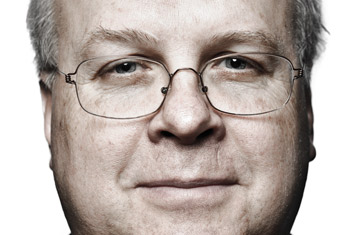
Karl Rove photographed Febuary 10th, 2010, as part of the World Affairs Council of Oregon's International Speaker Series, Portland, Oregon.
(4 of 7)
And in a very close race, money could be decisive. Rove believes a lack of cash helped doom McCain in 2008, when he was hugely outspent by Obama and outside Republican groups did little to help. After Obama was sworn in, Rove started talking with his friend and fellow GOP operative Ed Gillespie about how to better harness cash for elections. The men understood that the traditional power of the parties had been undermined by the 2002 McCain-Feingold campaign-finance-reform law, which barred party committees from raising unlimited soft-money donations. But the confusing, even nonsensical particulars of election law still allowed independent groups to raise and spend freely.
The result was American Crossroads, a super PAC that can expressly advocate for or against candidates if it discloses its donors every few months. But Rove understood that some wealthy donors prefer not to be known at all. That's why he created a nonprofit arm of his group called Crossroads GPS, which can keep its donors secret as long as it engages mostly in issue advocacy--which in reality can look like the $20 million negative ad campaign GPS ran last summer hammering Obama over the national debt.
More recently, American Crossroads has stepped up with a more explicit assault against Obama. "What happened to Barack Obama?" asks the concerned female narrator in one ad launched in mid-July. "The press and even Democrats say his attacks on Mitt Romney's business record are misleading, unfair and untrue." The President has gone negative, she says, because of his failures on the economy and the deficit: "Obama can't run on that record." That ad was part of a $9.3 million campaign in six swing states, including the big three of Florida, Ohio and Virginia.
More recently, Crossroads launched another ad supporting Romney. This one features small-business owners marveling at Obama's statement that "if you've got a business, you didn't build that." Never mind that the ad distorts Obama's point--that government supports the private sector with things like roads and bridges. (Crossroads ads are regularly deemed things like "exaggerated," "misleading" and "false" by media fact checkers.) Or that at least one of those small-business owners was revealed to be a paid actor. It still served as crucial backup for the Romney campaign, whose ability to advertise this summer is restricted. That's because election law divides a candidate's campaign cash into primary and general-election dollars. Romney burned through most of his primary cash fending off his GOP rivals this winter. But he can't spend his vast reserve of general-election money until he's officially nominated in Tampa later this month. Steve Law, who is the CEO of Crossroads and manages the group day to day, calls this period "the interregnum" and says Crossroads' support has been a vital buffer against Obama's summer advertising blitz. "We've helped Romney survive what was going to be a killing field for the Obama campaign," Law says.
